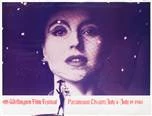
Kevin Thomas began reviewing films for the Los Angeles Times in 1962 and continues to do so after his official retirement at the end of 2005. He is the longest-running movie critic writing for the same daily in the history of American journalism.
Wellington Memories
I managed to catch up with my editor Charles Champlin just as he was to take off for the Cannes Film Festival. I somehow had heard that following the 1980 Sydney and Melbourne film festivals there would be one in Wellington – and also that the New Zealand Film Commission had recently been formed – and could I stopover on the way back from Australia to check out the festival and see what the prospects were for a New Zealand cinema? He hastily said, “Sure.”
This was back in the days when the Los Angeles Times, like other big metropolitan papers, had deep pockets, and it was no big deal to add to the expense of an already costly assignment. So I was soon off to one of the most wonderful experiences of my life, witnessing at first hand the recently launched New Wave in Australia and then heading on to Wellington. Along the way I would meet filmmakers and actors on the brink of world renown and visit three great cities, and form an enduring friendship with Mark Knowles, at the time the young film critic of the Evening Post.
I was instantly charmed by Wellington, which reminded me of the bayside towns of Marin County – that’s where the Golden Gate bridge takes you from San Francisco – Peter Jackson would be similarly reminded years later. I was warmly greeted by the film commission’s executive director Don Blakeney and its marketing director Lindsay Shelton, who was in his final year as the Wellington Film Festival’s founder-director. He would be my key contact and would spread the word around the world about New Zealand films and filmmakers and production facilities for decades to come. I attended festival screenings at the Paramount and the grand Embassy, and the commission screened for me at the National Film Unit the six films in which they had been involved.
The big discovery for me was, not surprisingly, the two short films made by 24-year-old Vincent Ward--A State of Siege, taken from a novel by Janet Frame and a stunning, almost surreal evocation of the disintegration of a spinster schoolteacher (the remarkable Anne Flannery) and In Spring One Plants Alone, a thoroughly devastating portrait of an 82-year-old Maori woman’s struggle for survival and to care for her infirm son; it would eventually lead to Ward’s astonishing, wrenching documentary on the woman’s life, Rain of the Children (2008). I sensed that I had come upon a world-class talent, and I was soon proven right.
The unforgettable moment in the festival, which was already adventuresome and ambitiously programmed, occurred during the screening of Phillip Noyce’s splendid Newsfront, which was based on the experiences of two Australian brothers who were newsreel cameramen just before TV news would render theatre newsreels obsolete. There was a clip from an actual newsreel reporting Sir Edmund Hillary’s conquest of Mt. Everest. When the stentorian narrator’s voice hailed the event as an “Anzac triumph” the audience at the Paramount hooted and hollered. Sitting next to me, Phil, whom I had met in Hollywood and had just spent time with in Sydney, was greatly amused. I congratulate the festival on its 40th anniversary.
It must be said that there is a decided poignance in looking back 31 years to my assignments in Australia and New Zealand. The film industries of both countries have flourished but were to be extensively co-opted by Hollywood. With the rise of the VHS, then the DVD, the Internet and the American independent cinema, foreign films, even those from English-speaking countries – apart from the U.K – have grown increasingly scarce at American movie theatres. Australia’s Animal Kingdom, which brought Jacki Weaver an Oscar nomination, was an all-too-rare exception. The late producer John O’Shea told me that “We must make room for the individual filmmaker who can express what it’s like to be a New Zealander. We’ve got to find out what we're about.” Three decades ago this was beginning to happen, I hope it still is.